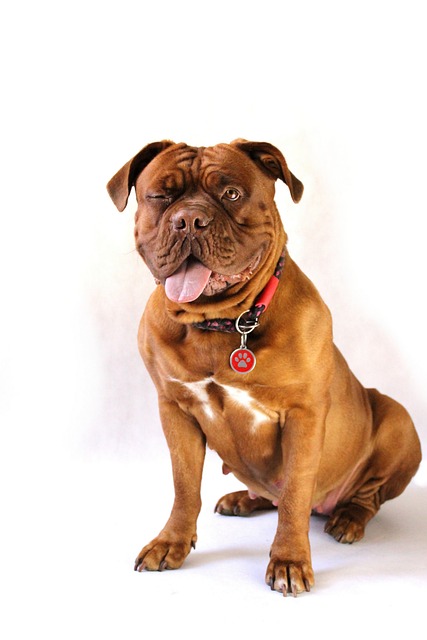


The Dogue de Bordeaux, also known as the French Mastiff, is a powerful, muscular, and dignified dog breed that was originally bred for guarding and protecting. Known for its impressive size and protective instincts, this breed is loyal and affectionate with its family but can be wary of strangers. The Dogue de Bordeaux is a natural protector, making it an excellent guard dog, but it is also known for its calm and gentle demeanor when it comes to its loved ones. They have a unique appearance with a broad head, a wrinkled face, and a thick, short coat that is usually a rich fawn or mahogany color.
The Dogue de Bordeaux originated in France, where it was used for guarding properties, livestock, and even as a working dog in various tasks, including pulling carts and protecting estates. The breed's history can be traced back over a thousand years, with some sources suggesting that it was a descendant of ancient molossers brought to the region by the Romans. In the past, the Dogue de Bordeaux was often used by French aristocrats to guard their estates, while also being employed for various protective tasks. The breed faced near extinction in the mid-20th century, but thanks to efforts by breeders, it has made a strong comeback and is now recognized as a popular companion and working dog breed worldwide.
The Dogue de Bordeaux is a large, powerful dog with a strong, muscular build. It typically stands between 23 to 27 inches (58 to 69 cm) at the shoulder and weighs between 90 to 110 pounds (41 to 50 kg), with males generally being larger than females. The breed has a broad head with a pronounced wrinkled face, large, round eyes, and a short, broad muzzle. Their coat is short, dense, and smooth, typically in shades of fawn, red, or mahogany, often with a darker mask around the face. Their ears are small and triangular, and their tail is thick at the base and tapers toward the tip. Despite their imposing appearance, the Dogue de Bordeaux is a gentle giant with a calm and loyal demeanor when properly socialized.
The Dogue de Bordeaux is known for its calm, affectionate, and loyal nature. They form strong bonds with their family members and are highly protective of their loved ones. This breed is typically good with children, making it an excellent family pet. Despite their size, Dogue de Bordeaux dogs are gentle and patient, particularly with young children. They are naturally reserved around strangers, but their protective instincts make them reliable guard dogs. Early socialization is important to ensure they are well-adjusted around new people, animals, and environments. Due to their strong guarding instincts, they can be territorial and need consistent training and boundaries.
The Dogue de Bordeaux has moderate exercise needs, given its large size and calm demeanor. Regular daily walks, coupled with some playtime in a secure area, are usually sufficient to keep them fit and healthy. While they enjoy outdoor activities, such as running or playing fetch, they are not as energetic as some other breeds and tend to be more relaxed indoors. It's important to avoid over-exercising them, especially as puppies, since their growing bones and joints require careful management. Providing mental stimulation through obedience training, puzzle toys, and interactions with their family will help prevent boredom and maintain their mental health.
The Dogue de Bordeaux is intelligent but can be somewhat independent, making training a challenge at times. They respond best to positive reinforcement methods, such as using treats, praise, and toys as rewards for good behavior. Early training and socialization are crucial to ensure they grow up to be well-behaved and obedient. Socializing a Dogue de Bordeaux with other animals, people, and various environments from a young age helps them become more comfortable in different situations. While they are naturally protective and territorial, early socialization can help mitigate any potential aggression toward strangers. Consistent, calm, and firm training is key to bringing out the best in this breed.
The Dogue de Bordeaux is generally a healthy breed, but like all large dogs, it can be prone to certain health issues. Some of the most common health problems include hip dysplasia, elbow dysplasia, heart issues such as cardiomyopathy, and certain skin conditions like hot spots or allergies. Due to their large size, they are also susceptible to bloat (gastric torsion), a life-threatening condition that requires immediate medical attention. Regular veterinary check-ups are important to catch any early signs of health problems. Grooming is relatively easy due to their short coat, but they do shed, so occasional brushing is recommended. Their wrinkles should be cleaned and dried regularly to prevent skin infections. Proper nutrition and maintaining a healthy weight are essential to avoid putting additional strain on their joints and organs.
The average lifespan of a Dogue de Bordeaux is typically between 8 to 10 years. This breed's longevity is influenced by factors such as genetics, overall health, and the level of care they receive throughout their life. Regular exercise, a balanced diet, routine vet visits, and good grooming practices can help extend their lifespan and improve their quality of life. Though they may have a shorter lifespan compared to smaller breeds, the Dogue de Bordeaux’s loyalty and affection make them cherished companions during their time with their families.
© copyright Dog Compendium 2024 - 2026